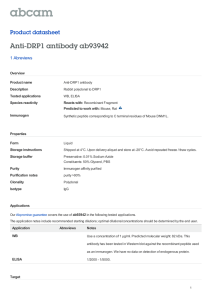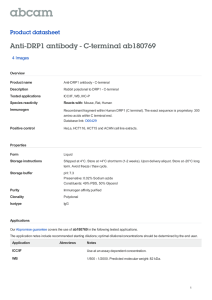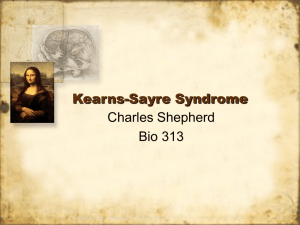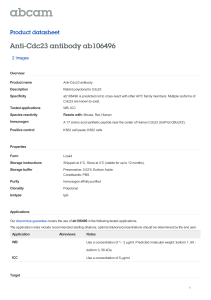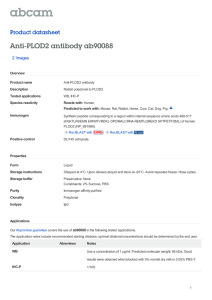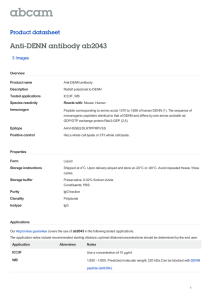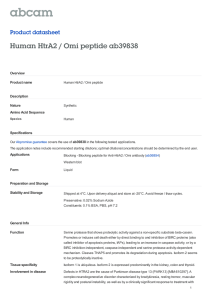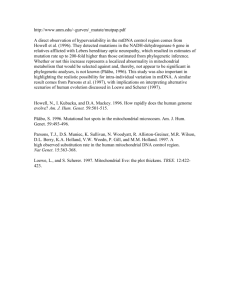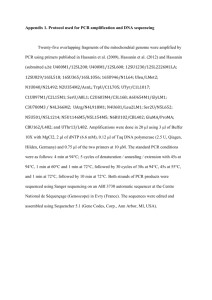Anti-DRP1 antibody ab54038 Product datasheet 1 Abreviews 1 Image
advertisement
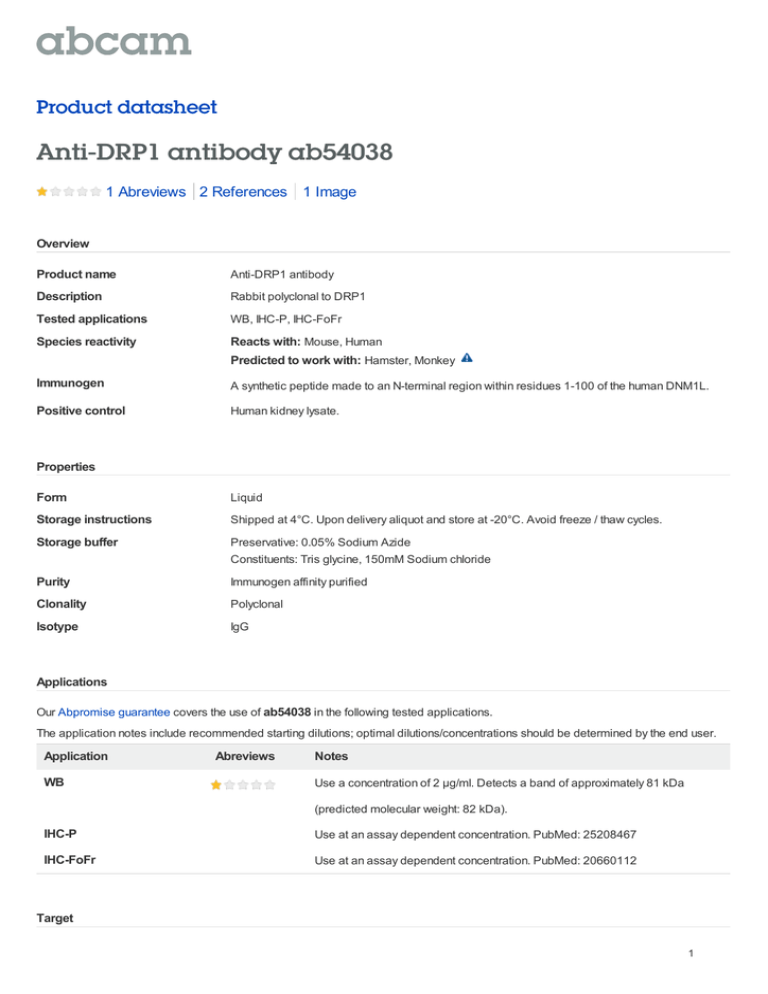
Product datasheet Anti-DRP1 antibody ab54038 1 Abreviews 2 References 1 Image Overview Product name Anti-DRP1 antibody Description Rabbit polyclonal to DRP1 Tested applications WB, IHC-P, IHC-FoFr Species reactivity Reacts with: Mouse, Human Predicted to work with: Hamster, Monkey Immunogen A synthetic peptide made to an N-terminal region within residues 1-100 of the human DNM1L. Positive control Human kidney lysate. Properties Form Liquid Storage instructions Shipped at 4°C. Upon delivery aliquot and store at -20°C. Avoid freeze / thaw cycles. Storage buffer Preservative: 0.05% Sodium Azide Constituents: Tris glycine, 150mM Sodium chloride Purity Immunogen affinity purified Clonality Polyclonal Isotype IgG Applications Our Abpromise guarantee covers the use of ab54038 in the following tested applications. The application notes include recommended starting dilutions; optimal dilutions/concentrations should be determined by the end user. Application WB Abreviews Notes Use a concentration of 2 µg/ml. Detects a band of approximately 81 kDa (predicted molecular weight: 82 kDa). IHC-P Use at an assay dependent concentration. PubMed: 25208467 IHC-FoFr Use at an assay dependent concentration. PubMed: 20660112 Target 1 Function Functions in mitochondrial and peroxisomal division. Mediates membrane fission through oligomerization into ring-like structures which wrap around the scission site to constict and sever the mitochondrial membrane through a GTP hydrolysis-dependent mechanism. Required for normal brain development. Facilitates developmentally-regulated apoptosis during neural tube development. Required for a normal rate of cytochrome c release and caspase activation during apoptosis. Also required for mitochondrial fission during mitosis. May be involved in vesicle transport. Isoform 1 and isoform 4 inhibit peroxisomal division when overexpressed. Tissue specificity Ubiquitously expressed with highest levels found in skeletal muscles, heart, kidney and brain. Isoform 1 is brain-specific. Isoform 2 and isoform 3 are predominantly expressed in testis and skeletal muscles respectively. Isoform 4 is weakly expressed in brain, heart and kidney. Isoform 5 is dominantly expressed in liver, heart and kidney. Isoform 6 is expressed in neurons. Involvement in disease Note=May be associated with Alzheimer disease through beta-amyloid-induced increased Snitrosylation of DNM1L, which triggers, directly or indirectly, excessive mitochondrial fission, synaptic loss and neuronal damage. Sequence similarities Belongs to the dynamin family. Contains 1 GED domain. Domain The GED domain folds back to interact, in cis, with the GTP-binding domain and middle domain, and interacts, in trans, with the GED domains of other DNM1L molecules, and is thus critical for activating GTPase activity and for DNM1L dimerization. Post-translational modifications Phosphorylation/dephosphorylation events on two sites near the GED domain regulate mitochondrial fission. Phosphorylation on Ser-637 inhibits mitochondrial fissin probably through preventing intramolecular interaction. Dephosphorylated on this site by PPP3CA which promotes mitochondrial fission. Phosphorylation on Ser-616 also promotes mitochondrial fission. Sumoylated on various lysine residues within the B domain. Desumoylated by SENP5 during G2/M transition of mitosis. Appears to be linked to its catalytic activity. S-nitrosylation increases DNM1L dimerization, mitochondrial fission and causes neuronal damage. Ubiquitination by MARCH5 affects mitochondrial morphology. Cellular localization Cytoplasm > cytosol. Golgi apparatus. Endomembrane system. Mainly cytosolic. Translocated to the mitochondrial membrane through interaction with FIS1. Colocalized with MARCH5 at mitochondrial membrane. Localizes to mitochondria at sites of division. Associated with peroxisomal membranes, partly recruited there by PEX11B. May also be associated with endoplasmic reticulum tubules and cytoplasmic vesicles and found to be perinuclear. In some cell types, localizes to the Golgi complex. Anti-DRP1 antibody images 2 All lanes : Anti-DRP1 antibody (ab54038) at 2 µg/ml Western blot - Anti-DNM1L antibody (ab54038) Lane 1 : Drp1-mut Lane 2 : OPA1-null Lane 3 : Double mut Lane 4 : Mfn2-null Lane 5 : Mfn1-null Lane 6 : Wildtype. Predicted band size : 82 kDa Please note: All products are "FOR RESEARCH USE ONLY AND ARE NOT INTENDED FOR DIAGNOSTIC OR THERAPEUTIC USE" Our Abpromise to you: Quality guaranteed and expert technical support Replacement or refund for products not performing as stated on the datasheet Valid for 12 months from date of delivery Response to your inquiry within 24 hours We provide support in Chinese, English, French, German, Japanese and Spanish Extensive multi-media technical resources to help you We investigate all quality concerns to ensure our products perform to the highest standards If the product does not perform as described on this datasheet, we will offer a refund or replacement. For full details of the Abpromise, please visit http://www.abcam.com/abpromise or contact our technical team. Terms and conditions Guarantee only valid for products bought direct from Abcam or one of our authorized distributors 3
